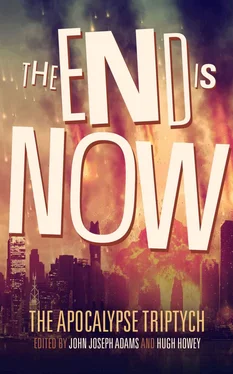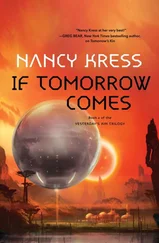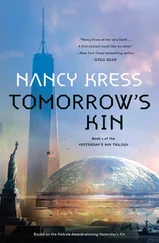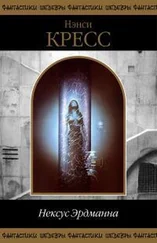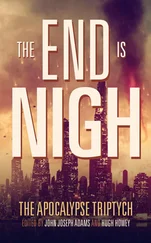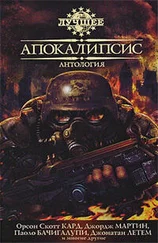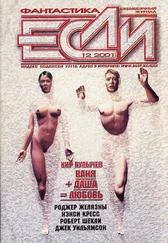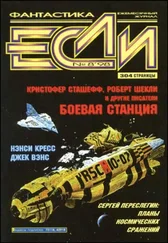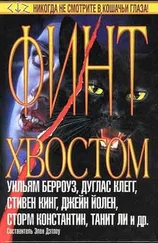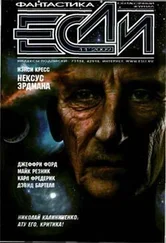Nikki was counting on me.
My bag was heavy with candy bars and chips and bottles of juice. They were getting harder and harder to find. They would have been exhausted already if most of the survivors hadn’t learnt to avoid them, leaving them sitting alone on shelves that had been otherwise picked clean. I ran, and kept on running until I saw the familiar shape of the U-Haul appear on the street ahead of me. It was parked in front of a burnt out gas station—one of my favorite places, since the fire had cleared all the stunted bushes away from the front of the structure. Less risk there.
It was funny that I still thought that way, that I couldn’t stop thinking that way, even though the greatest risk was the one I carried with me.
But I still wasn’t infected.
“Honey?” I unlocked the back of the truck and rolled it upward. The lights inside didn’t come on. I had disabled them on the second day, when they started to hurt her more than they could possibly be helping me. “I’m back. Honey?”
“Here, Mom.” Nikki’s voice came from the darkness that filled the back half of the truck. The sunlight couldn’t pierce that far. There was something indefinably blurry about her words, like her lips no longer hit the consonants the way that they were supposed to. I hadn’t looked inside her mouth since the third day, when I had seen the mold creeping over her rear molars, turning them into a field of solid gray.
And I still wasn’t infected.
If the blurriness was subtle, the bitterness was not. “Where else would I be?”
“Sorry. Sorry.” The thought of boosting myself into that softly blurred darkness made my stomach clench and turned my lungs to concrete. But it was Nikki’s voice speaking to me from the shadows; my little girl, my baby, the best and messiest thing I ever did in my life. I braced my free hand on the plastic-covered metal and pushed myself up, landing on my knees at the border of the gloom. “I brought you some juice.”
Her laughter was wet and heavy, burbling up through some unspeakable layer of material before it breaks the surface. “I thought juice was bad for me. Too much of an ideal growth medium.”
Anything I could have said would have been the wrong thing, and so I didn’t say anything at all. I just inched forward until the first traces of gray appeared on the plastic sheeting. Then I started lining up the juice bottles, positioning them each with unthinking precision. I could hear Nikki’s breathing from ahead of me, thick and labored. I tried to shut it out, focusing instead on the task at hand.
I was being a good mother.
I was taking care of my child.
I was doing the only thing I could do. I hadn’t protected her, I hadn’t been able to keep her safe, I hadn’t done the one thing a mother should be able to do—I hadn’t prevented my daughter from coming to harm. It was too late for me to save her.
But I could do this. I finished the line of juice bottles and began breaking the seals on their lids, twisting them until the threads snapped and their contents were revealed. Nikki’s breathing grew faster as excitement chased away her bitterness, leaving only need behind. She didn’t move though, not until I had opened the last bottle and withdrawn to the thin band of light at the mouth of the truck.
Then Nikki moved.
She didn’t have legs anymore, not as distinct things—“right leg” and “left leg” were concepts that Nikki had left behind on day three, when R. nigricans had transformed her into a fungal mermaid. Or maybe she was a lamia, one of the snake-women of myth, because when she dragged herself along the floor, a thick tail of knotted gray followed her. It was like an umbilical, connecting her to her new womb. But this mother couldn’t sustain her, not the way that I had when she grew inside my belly: this mother needed help. Help that only I could provide, by bringing growth media into the darkness. Things that Nikki and her new mother could both use to feed themselves.
Maybe that was where we’d gone wrong with Rachel. We had tried to starve the fungus, denying it the healthy sugars and gelatins it needed, and in return, it had consumed my wife. Rachel had been infected and eaten alive in a matter of hours. I ran away before I could see her die, but I had no doubt that she’d been consumed by the end of that first day. Nikki was on her sixth day of infection, and she was still herself, still speaking and thinking and behaving as a person. A different kind of person, maybe—a person with different needs and limitations—but still a person.
She was still my little girl.
The hands that reached out to grab and lift the juice bottles were more like tentacles, appendages wiped clean of detail and nuance by the process of . . . of softening that she had undergone, that she was still undergoing. I watched as she fumbled to pull the juice into her darkness, marking the places where her skin was still smooth and human. Her tan was fading fast, leaving even the human parts of her sickly and pale. But those human parts were there. I could see them.
As long as I could see them, she could be saved.
Somehow. If a cure was found. If the government pulled itself back together. My life had become a fragile scaffolding of “if,” all hanging on the pale, sickly patches of skin on my little girl’s arms.
Her face was still half her own. The growth on her right cheek and jaw had continued to spread, but it had avoided the eye and most of her nose. There was a thin crust of fungus in her right nostril. The left side was unblemished gray, featureless, until she opened her mouth. The right side was still a mouth. It opened like a human thing. The left side gaped too widely, slicing deep into what should have been her cheek, drawing a hungry slash from here to there. She poured juice into the opening—cranberry, grapefruit, orange—mixing them without pausing to consider how the results would taste. Flavor had stopped being a concern when the fungus overtook her tongue. All she cared about now was the sugar.
I watched her drink the first bottle, spilling as much as she actually managed to get into the dark cavern of her mouth. I tried to take a snapshot of her fungus-blotched face, measuring against the snapshot I had taken the day before, looking for the places where her features had melted into the gray. Nikki raised her eye and caught me looking. Her lips twisted into an expression I couldn’t read anymore—smirk or sneer, it was impossible to say—and she withdrew into the shadows, a bottle of juice wrapped in the gray appendages that had been her arms.
“The light hurts me,” she said, that old familiar whine in her voice. She used to use it when we wouldn’t let her stay out late with her friends, when we tried to talk to her about boys or tried to interfere in her life. It was almost obscene, hearing it in this place, in this situation. But what wasn’t obscene about our lives, anymore?
“All right, honey,” I said, and withdrew, sliding back along the plastic until my feet dangled above the ledge. Then I dropped, back onto the pavement, and pulled the door down, blocking out the light.
As soon as the truck was sealed again my heart began to hammer against my ribs, panic overtaking me. I could maintain the lines between my daughter and my disorder when she was there in front of me, but when she was gone . . .
I peeled the gloves off my hands, searching the skin for traces of mold. Once I was sure it was clean, I reached up and felt my face, looking for fuzzy places, for soft places. Only after I had failed to find them did I allow myself to sink all the way down to the ground, and cover my face with my hands, and cry.
* * *
I parked the U-Haul in a vacant lot that was blackened by burn scars. There was no gray softness here; whoever had decided to burn the place had used the right kind of accelerant to render the ground unpalatable to even the toughest spores. It wouldn’t last, but for now, we would be safe here, and it wasn’t like we were going to stay for long. I needed to get us to a lab, someplace with the facilities to help me isolate whatever natural resistance I had given to my daughter.
Читать дальше
